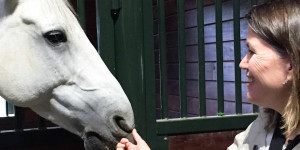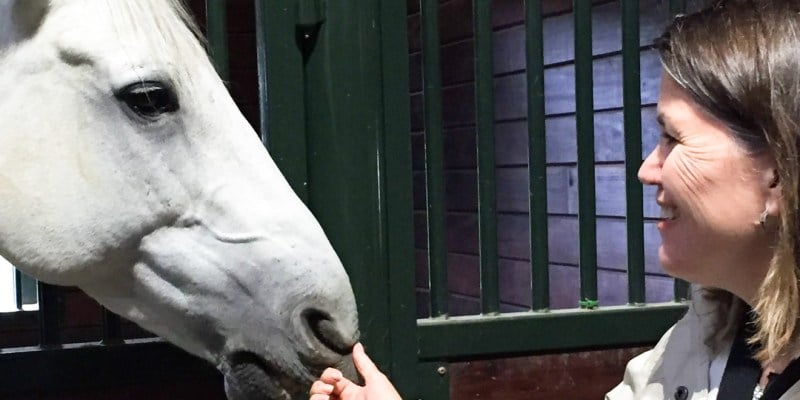
The second program to use horses to treat the symptoms of dementia, following a similar program in Ohio, the Connected Horse Project was initiated by Paula Hertel and Elke Tekin, co-founders of ElderHub and countless other organizations that provide elder care resources and work toward developing assisted living programs.
Emphasizing a “care vs. cure” approach, the program aims to fill a gap in the treatment of early onset dementia by meeting the need for psychosocial interventions that offer participants an opportunity to achieve a better quality of life while living with the disorder.
To develop the program, Hertel and Tekin partnered with Jacqueline Hartman, co-founder and head facilitator of the Stanford Red Barn Leadership Program, to create a series of workshops that offer participants a way to interact safely with horses and work on self-determined goals like developing patience, overcoming a fear or becoming more open to new experiences.
According to Hartman, a combination of trained staff, horses, people, evaluation, curriculum and methodology helps patients break up the patient-doctor dependency dyad and facilitates collaboration and communication between patients.
“We saw a great need and a great stigma [associated with early onset dementia],” Hertel said when asked what inspired the project.
She added that for patients, the impact of early onset dementia often creates a dependency model that relies on strict patient and doctor roles. According to Hertel, the fact that individuals with the disorder have a tendency to isolate themselves indicates that patients need a way to stay connected with purpose and meaning.
That’s where the horses come in.
“Horses have the innate ability to pick up on emotions and act as equine facilitators,” Hertel said in an interview with The Daily, just before the results of the pilot research study were presented at Stanford’s annual Community Health Symposium this past Thursday.
The study was conducted by Dolores Gallagher Thompson, professor of research in the Department of Psychiatry and Behavioral Sciences and director of the Stanford Geriatric Education Center. People ages 70 and younger with a diagnosis of early onset dementia, along with their primary care partners, were recruited to participate in the study.
Individuals underwent a series of medical and safety screenings and an oral interview, since written questionnaires can be difficult to fill out for those affected by early onset dementia. Once selected, they participated in two Connected Horse Project workshops.
Nusha Askari, senior administrator at Stanford Alzheimer’s Disease Research Center, was pleased with the results of the study.
“Everyone commented about the trust,” Askari said. “An amazing level of trust and camaraderie developed over a very short time.”
All of those involved in running the program said they noticed a clear difference in the confidence and comfort level of the patients by the end of the study — especially in their newly open demeanors and improved postures.
“A picture is worth a thousand words,” Gallagher Thompson said.
Gallagher Thompson admitted to being initially skeptical of the idea and noted that change is not always “something you can capture on a questionnaire.”
However, Gallagher Thompson, Hartman and the rest of the Connected Horse team still hope to continue the progress made by the organization by conducting a larger study that hopes to expand to include a scalable national and potentially international model endorsed by the Alzheimer’s Association. They encourage Stanford students who feel passionate about elder care and mental illness to visit Stanford’s new Alzheimer’s Disease Research Center on Quarry Road.
“In a world where people are losing intimacy skills, it’s really important to have the ability to connect,” Hartman said. “Treatment of early onset dementia is usually focused on one or the other [either the patient or the treatment], but in this project, treatment is a journey you [the horse and the patient] are doing together.”
Contact Sandra Ortellado at sortella ‘at’ stanford.edu.
